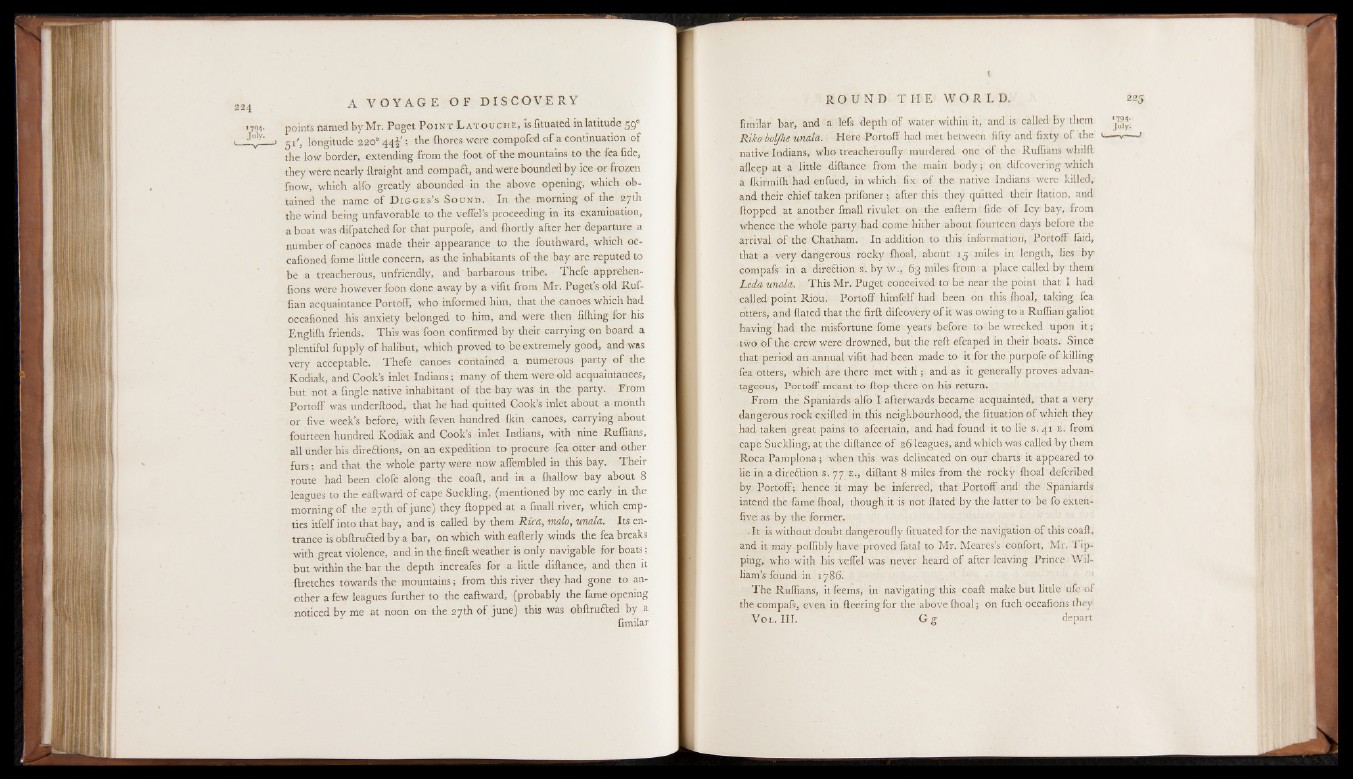
>794- points named by Mr. Puget Po in t L atoucshe, is fituated in latitude 59«
1 J“ly' j longitude 220° 44^'; the fhores were compelled of a continuation of
the low border, extending from the foot of the mountains to the fea fide,
they were nearly ftraight and com pa cl, and were bounded by ice or frozen
. fnow, which alfo greatly abounded in the above opening, which obtained
the name of D i g g e s ’s S o u n d . In die morning of the 27th
the wind being unfavorable to the veflel’s proceeding in its examination,
a boat was difpatched for that purpofe, and Ihortly after her departure a
number of canoes made their appearance to the fouthward, which oC-
cafioned fome little concern, as the inhabitants of the bay are reputed to
be a treacherous, unfriendly, and barbarous tribe. Thefe apprehen-
fions were however foon done away by a vifit from Mr. Puget’s old Ruffian
acquaintance PortofF, who informed him, that the canoes which had
occafioned his anxiety belonged to him, and were then filhing for his
Englilh friends. This was foon confirmed by their carrying on board a
plentiful fupply of halibut, which proved to be extremely good, and was
very acceptable. Thefe canoes contained a numerous party of the
Kodiak, and Cook’s inlet Indians; many of them were old acquaintances,
but not a Angle native inhabitant of the bay was in the party. From
PortofF was underflood, that he had quitted Cook s inlet about a month
or five week’s before,- with feven hundred fkin canoes, carrying about
fourteen hundred Kodiak and Cook’s inlet Indians, with nine Ruffians,
all under his directions, on an expedition to procure fea otter and other
furs; and that the whole party were now affembled in this bay. Their
route had been clofe along the coafl, and in a fhallow bay about 8
leagues to the eaftward of cape Suckling, (mentioned by me early in the
morning of the 27th of june) they flopped at a fmall river, which empties
itfelf into that bay, and is called by them Rica, malo, unala. Its entrance
is obftrufted by a bar, on which with eafterly winds the fea breaks
with great violence, and in the fineft weather is only navigable for boats;
but within the bar the depth increafes for a little diftance, and then it
ftretches towards the mountains ; from this river they had gone to another
a few leagues further to the eaftward, (probably the fame opening
noticed by me at noon on the 27th of June) this was obfiruCited by a
fimilar
fimilar bar, and a lefs depth of water within it, and is called by them
Riko boljhe unala. \ Here PortofF had met between fifty and fixty of the
native Indians, who .treacheroufly murdered one of the Ruffians whilft
afleep at a little diftance from the main body, on difcovering which
a fkirmiffi had enfued, in which fix of the native Indians were killed,
and their chief taken prifoner; after this they quitted their ftation, and
flopped at another fmall rivulet on the eaftern fide of Icy bay, from
whence the whole party had come hither about fourteen days before the
arrival of the Chatham. In addition to this information, PortofF faid,
that a very darfgerous rocky ffioal, about 15 miles in length, lies by
compafs in a direction s. by w.y 63 miles from a place called by them
Leda unala. This Mr. Puget conceived to be near th,e point that I had
called point Riou. PortofF himfelf had been on this fhoal, taking fea
otters, and ftated that the firft difcovery o f it was owing to a Ruffian galiot
having had the misfortune fome years before to be wrecked upon it;
two o f the crew were drowned, but the reft efcaped in their boats. Since
that period an annual vifit had been made to it for the purpofe of killing
fea otters, which are there met with ; and as it generally proves advantageous,
PortofF meant to flop there on his return.
From the Spaniards alfo I afterwards became acquainted, that a very
dangerous rock exifted in this neighbourhood, the fituationof which they
had taken great pains to afcertain, and had found it to lie s. 41 E. from
cape Suckling, at the diftance of 26 leagues, and which was called by them
Roca Pamplona; when this was delineated on our charts it appeared to
lie in a direction s. 77 E., diftant 8 miles from the rocky fhoal defcribed
by PortofF; hence it may be inferred, that PortofF and the Spaniards
intend the fame fhoal, though it is not ftated by the latter to be fo exten-
five as by the former.
■ It is without doubt dangeroufly fituated for the navigation of this coaft,
and it may poffibly have proved fatal to Mr. Meares’s confort, Mr. Tipping,
who with his veffel was never heard of after leaving Prince William’s
found in 1786.
The Ruffians, it feems, in navigating this coaft make but little ufe of
the compafs, even in fleering for the above fhoal; on fuch occafions they
V o L. III. G g depart